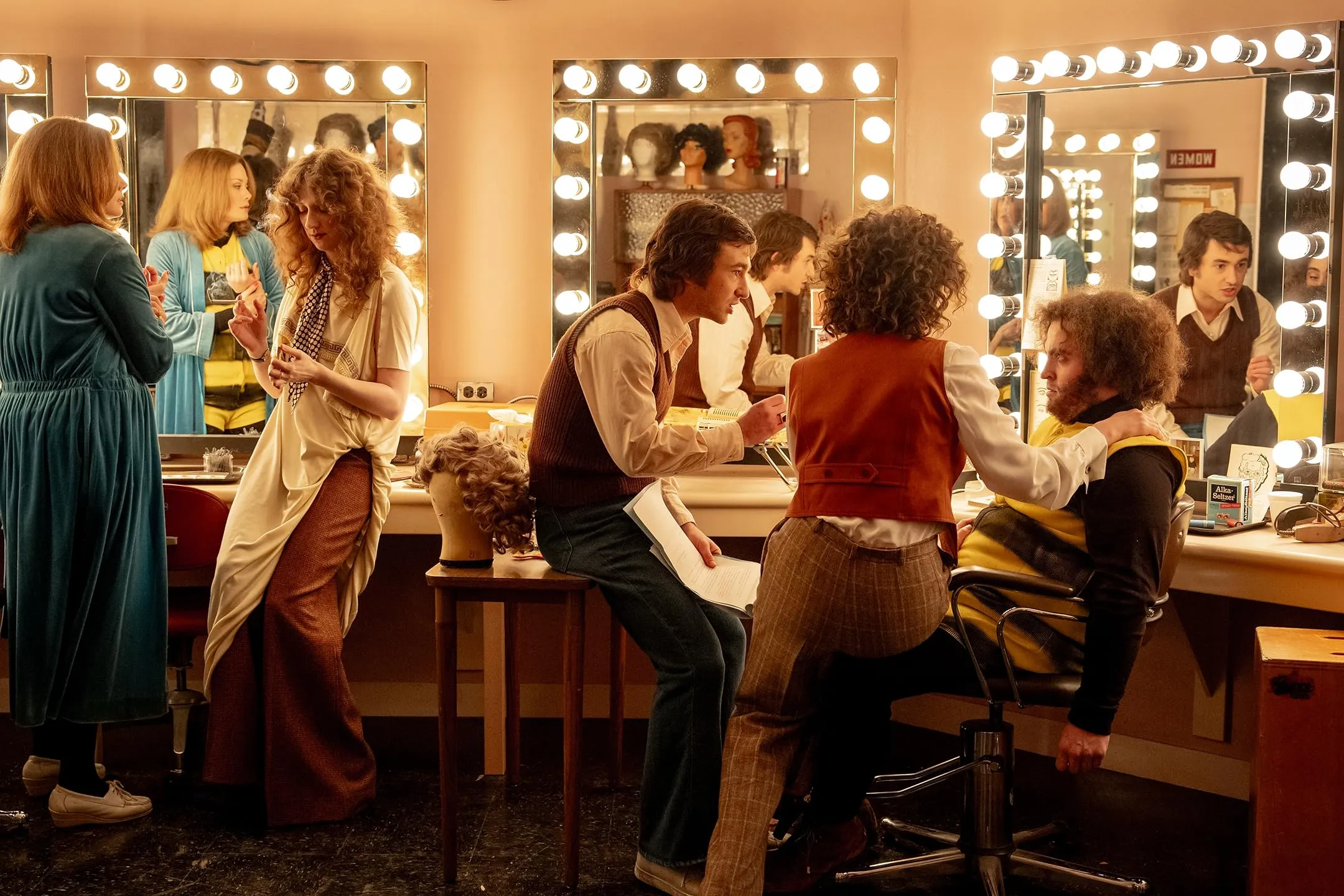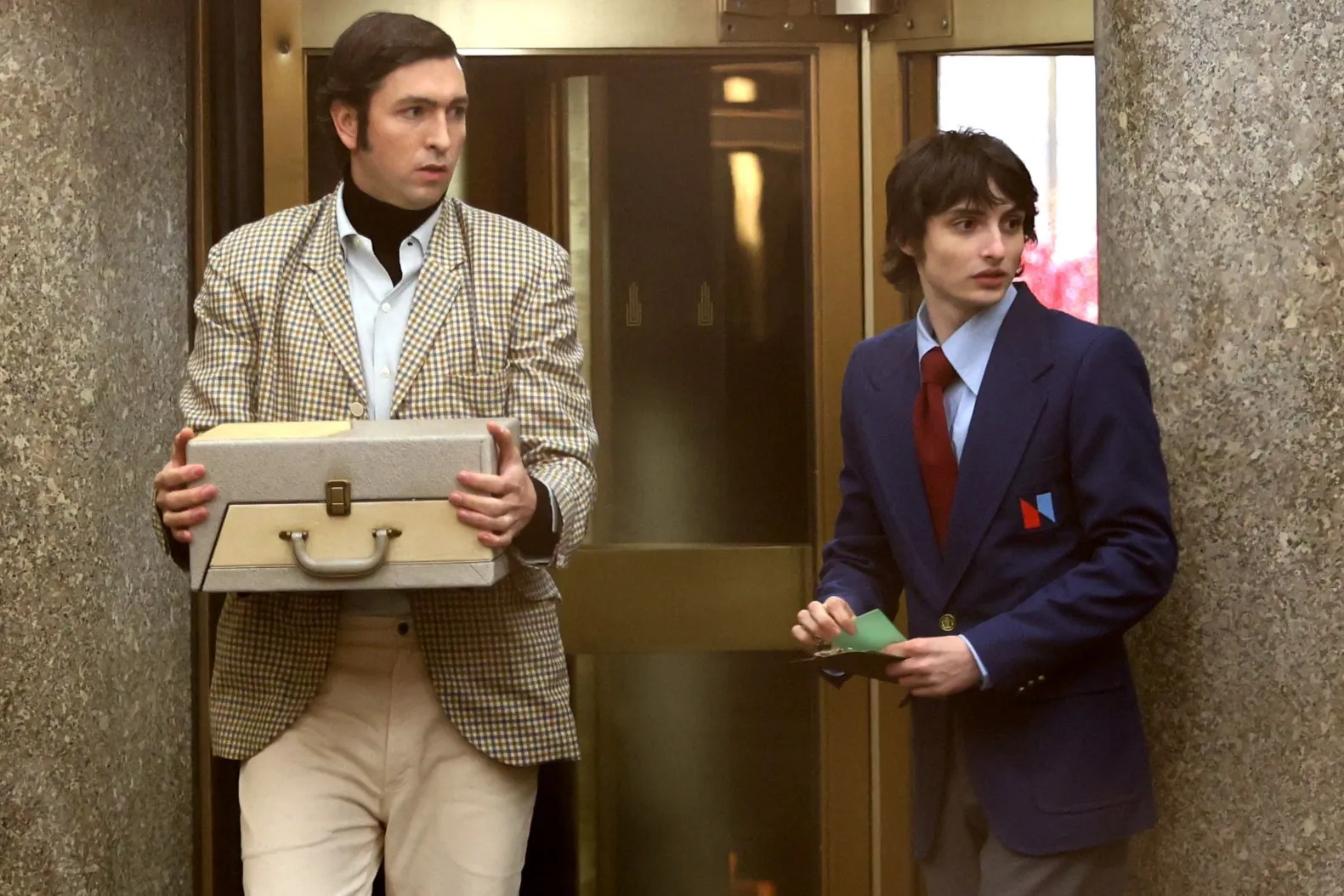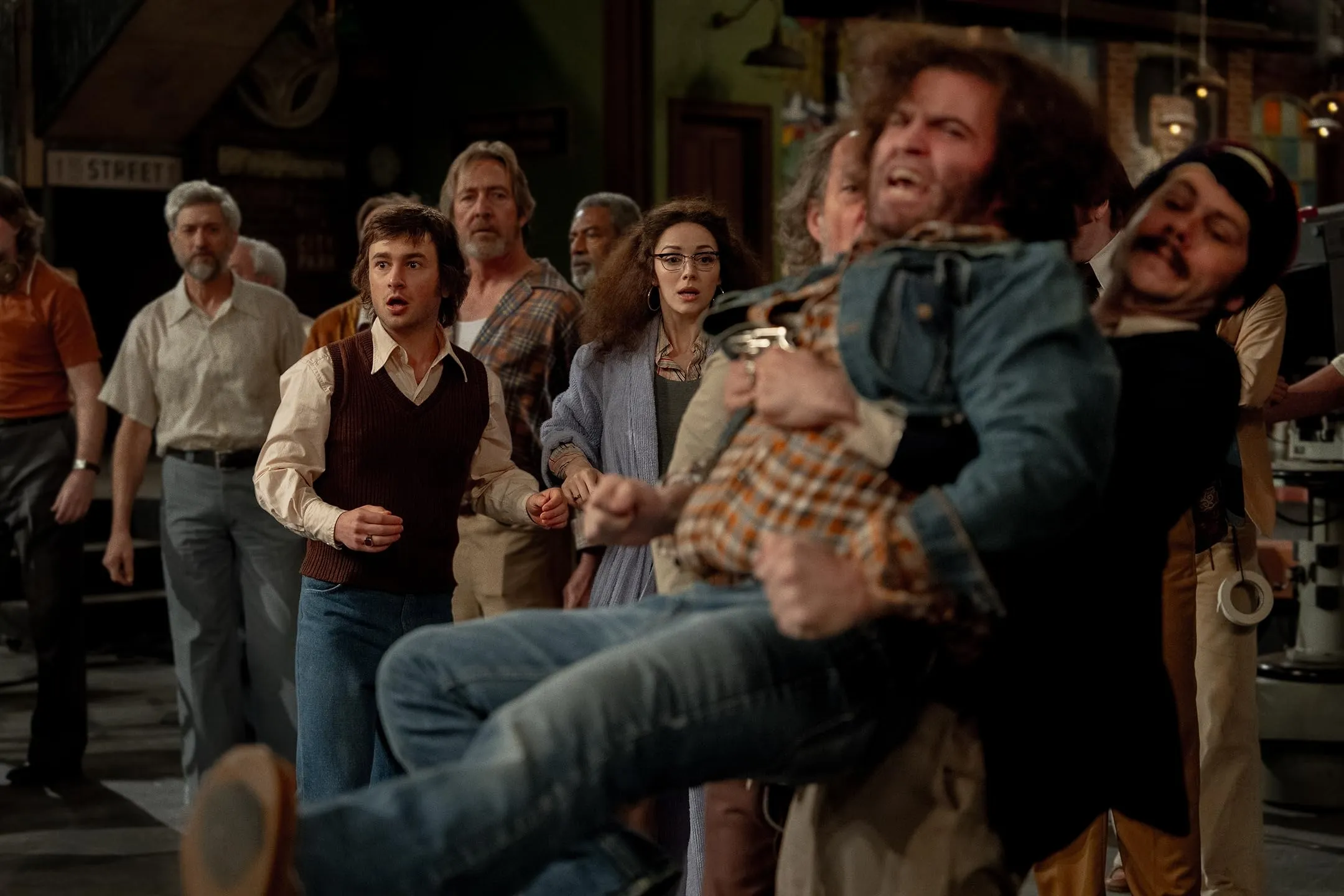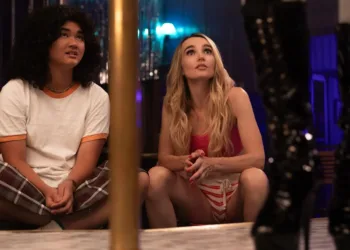It’s hard to overstate just how much Saturday Night Live has permeated popular culture in America over nearly 50 years on the air. Week after week, the long-running sketch show has minted comedic stars and debuted characters that feel instantly familiar even today. Now, filmmaker Jason Reitman shines a light on the chaotic genesis of this television phenomenon in his latest picture, Saturday Night.
Focusing on the frantic hours and minutes leading up to the very first episode’s live broadcast in 1975, Reitman transports viewers backstage as the unproven troupe struggles to bring their unconventional vision to the small screen.
With its counterculture spirit and young, fresh voice, SNL aimed to speak directly to the generation that grew up on television. But whether viewers at home would tune in, let alone understand this strange new kind of show, was very much in doubt. At NBC headquarters in Manhattan on the night of October 11th, producer Lorne Michaels and his scrappy band of comics faced an uphill battle.
With no time to waste before their 11:30 PM airtime, they had an overwhelming amount of material planned and the network brass looking for any excuse to pull the plug. Backstage, crises were erupting as tempers and egos flared. Could these creative outsiders actually defy the expectations and pull off a live broadcast that changed the face of television comedy? Reitman takes us right to the center of the frenzied mix as the countdown clock ticks toward this historic broadcast.
Backstage Bedlam: The Frenzied Launch of Saturday Night Live
It’s the evening of October 11, 1975, and behind the scenes at NBC’s iconic New York headquarters, chaos is reigning. Saturday Night Live is set to make its debut broadcast in just a few short hours, but with three hours worth of planned sketches, musical numbers, and other segments, producer Lorne Michaels has an overloaded schedule to somehow cram into a 90-minute time slot.
As the clock ticks down, Michaels is pulled in countless directions at once. Tempers are starting to flare between outspoken head writer Michael O’Donoghue and the humorless network censors. One of the lighting directors suddenly walks off the job. Untested talent like John Belushi and Jane Curtin run through anxious rehearsals, hoping their contributions won’t end up on the cutting room floor.
Michaels’ unique vision for this new kind of live comedy/variety show is facing resistance at every turn. Network exec David Tebet is itching to pull the plug, while NBC moneymaker Johnny Carson is actively lobbying against the program. Even Michael’s wife, Rosie, questions her role. Through it all, the young producer refuses to budge, convinced this NOT-ready-for-primetime group of misfits are on the cusp of creating something truly groundbreaking for television.
Backstage, the mayhem intensifies by the minute. A falling light fixture nearly causes injury. The experimental backdrop of NYC itself catches fire. Egos flare, and drugs start to flow freely. Bill Murray hovers around, hoping to sneak onto the cast list. Out in the hallways, no one can account for the sudden appearance of a roaming llama.
Just as it seems things couldn’t get more disorderly, legendary icons like Milton Berle and Chevy Chase arrive, flexing their sizable personalities for all to see. With showtime looming, the pressure is reaching fever pitch. Will Lorne Michaels’ vision actually get the chance to be seen by America? Tune it at 11:30 PM to find out!
Behind-the-Scenes Brilliance
Right from the opening scenes, it’s clear director Jason Reitman has pulled out all the stops to immerse viewers in the frantic world of Saturday Night Live. Production designer Jess Gonchor deserves major props for the painstaking recreation of the legendary Studio 8H. Stepping onto the soundstage, I felt transported back in time, surrounded by the sights and sounds of 1970s sketch comedy.
Reitman leverages this authentic environment to its fullest. His camerawork buzzes around the bustling backstage like caffeinated gnat. Complex choreography captures frenzied moments that perfectly heightened the tension. Split-second transitions slam us from one fast-moving scene to the next. It’s easy to get swept up in the whirlwind pace.
Another artistic genius helping set the scene is Jon Batiste and his live-recorded jazz score. Full of bang, clang, and drum-driven mayhem, his music perfectly mirrored the organized chaos unfolding on screen. At moments it threatened to drown out dialogue, pulling viewers deeper inside the characters’ frazzled mindset. Stepping into the control room was like coming up for air.
Together, Reitman’s intricate direction and Batiste’s innovative sounds succeed in transporting the audience back to 30 Rock on that fateful night. The authenticity of detail plays a huge role in making this story about television history come to life in a way that feels vibrantly real and present. Kudos to all involved for a true cinematic magic that kept me on the edge of my studio seat throughout!
Stepping into Comedy’s Biggest Shoes
One of the biggest challenges in Saturday Night was finding actors who could convincingly portray television comedy legends. But Jason Reitman pulled off a small miracle with his casting selections.
Right from the start, Gabriel LaBelle owns the role of Lorne Michaels. You believe the panic and passion radiating off him. As the show spins out of control, LaBelle makes Michael’s vision and leadership compelling.
Equally impressive is Dylan O’Brien as Dan Aykroyd. It’s like he disappeared into the character, showcasing the wild creativity that made Aykroyd a star. Meanwhile, as Chevy Chase, Cory Michael Smith balances the bravado with hidden insecurities in a very human performance.
Nicholas Braun is a standout too, juggling dual parts as Andy Kaufman and Jim Henson with nuanced aplomb. You can see the soul of these eccentric comedians in his portrayals.
In supporting turns, Ella Hunt infuses Gilda Radner with an infectious joy. As Jane Curtin, Kim Matula stealthily commands respect with wit and intelligence. Emily Fairn brings mercurial charm to Laraine Newman too, using minimal dialogue.
Together, this talented ensemble forges an authentic family of performers. You feel their dynamics, hungers, and fears. Even when taking on comedy deities, they make the legends feel relatably human.
It’s a testament to Reitman’s astute casting that Saturday Night achieves the near-impossible task of bringing TV’s funniest to life on the big screen in a fully believable way.
Honoring Comedy’s Rebels
One thing that comes through is Jason Reitman’s appreciation for how Saturday Night Live broke boundaries. The seeds were sewn decades earlier by nonconformists like Lenny Bruce, irreverent duos like Cheech and Chong, and social critics such as first host George Carlin.
At a time of cultural ferment, Lorne Michaels grasped that younger audiences wanted something different. Something that needled convention and gave a stage to new voices disrupting the status quo. Despite pushback from stuffy executives, Michaels pushed ahead with his non-establishment vision.
He wasn’t afraid to let uncensored talent run wild either. Like when he stepped aside to let the unpredictable Chevy Chase take the reins of Weekend Update early on. Or let John Belushi’s intensity drive sketches. Reitman makes it clear this empowerment of rule-breakers is what made the show resonate so deeply.
Saturday Night Live immediately registered as the antithesis of traditional variety shows and helped expand what was considered acceptable on TV. In turn, it fostered new eras of satire and embraced America’s eccentric side. Reitman honors how the program shined a light on societal fault lines and captured the progressive zeitgeist.
Most impressive is how he shows Michael’s prescience that change was in the air. By nurturing provocateurs, Michaels tapped into audience desires that reshaped the comedy landscape for decades to come. Saturday Night’s renegade spirit disrupted and evolved through the years, just as the counterculture it hailed would continue to do.
Bending the Facts for Cinematic Effect
It’s obvious Reitman didn’t strive for a documentary-style re-creation of that famous night. Some of the narratives he weaves seem anachronistic or take artistic license with facts.
Scenes like Berle clashing with Chase likely didn’t happen so early on. And I’m sure the timeline of Akroyd’s Julia Child sketch was moved up. Purists might nitpick errors like those.
But who really cares about 100% historical accuracy when the movie captures the spirit and struggles of the period so well? Reitman’s priority was crafting a story that entertains while shining new light on TV comedy history.
In that vein, the creative tweaks work. They bring more dramatic texture and fun mini-subplots that add welcome tension. Even knowing the show’s success, Reitman still sows enough seeds of doubt you can’t help but root for Michaels to pull it off.
At the end of the day, it’s a biopic focused on entertainment over education. A few facts bent here or there aren’t likely to misinform audiences about this landmark TV turning point. And they do help modern viewers relate to the pressure and stakes of that inaugural live broadcast. Sometimes fictionalization brings the past to life better than strict reconstruction ever could.
Achieving TV Comedy Immortality
Through its riveting retelling of that make-or-break launch night, Saturday Night cements itself as the definitive cinematic treatment of SNL’s pioneering origins. By narrowing its focus on the 90-minute backstage madness, Reitman creates an electric time capsule that feels lived-in and true.
This casts the iconic stars in a new light, bringing them from larger-than-life to relatably human through pitch-perfect performances. But more than any individual element, it’s Reitman’s clear affection for the material that shines through.
Despite knowing the show’s illustrious future, he generates real suspense around whether it will even see air. This lets viewers experience the creative gamble as it unfolds. We root for Lorne Michaels’ bold vision to succeed against all odds.
In capturing a seminal moment that reshaped comedy, Reitman redeems himself from past misses. He proves perfectly suited to handle projects about persevering against failure. Saturday Night is a love letter that does justice to its subjects’ influence.
For anyone with a passion for TV history or the unpredictable magic of live sketch comedy, it’s an absolute must-see. Fans will exit buzzing about that pressure-packed night and the stars who used it to achieve small-screen immortality.
The Review
Saturday Night
In succinctly capturing the pivotal suspense and artistry of SNL's rookie launch, Saturday Night does right by its legendary subjects. Reitman's film lovingly beams viewers straight back to 30 Rock on that frenzied October Eve in 1975. Anchored by stellar performances and diretoral flair, it brings the counter-culture comedy revolution stirring America into vivid focus.
PROS
- Authentic recreation of historical context and tension
- Exceptional cast brings icons to life in a humanizing way.
- Reitman's clear affection for the material shines through.
- Generates real suspense around the episode's uncertainty.
- Offers invaluable insight into SNL's game-changing origins
CONS
- Some timelines and details take creative liberties.
- Frenetic pacing in places risks losing viewers.




















































Discussion about this post